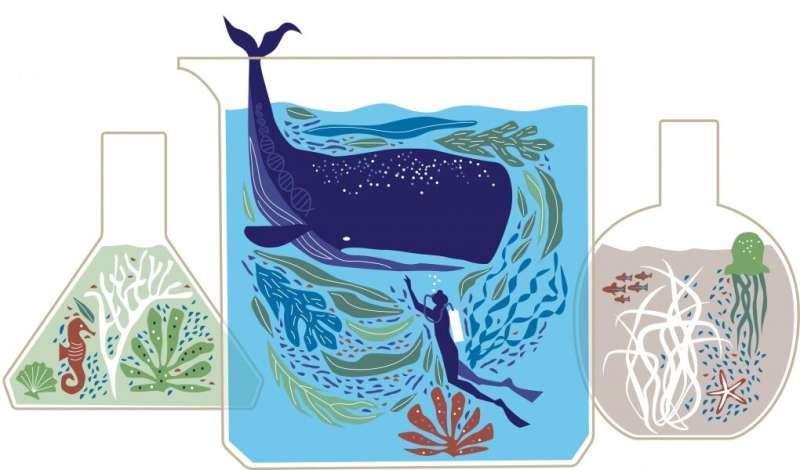Credit: Laura Hughe
Oxford University epidemiologist Richard Peto was puzzled by a paradox: If cancer is a function of individual cells going haywire, wouldn't an organism with a lot more cells, say a whale, have a greater chance of getting cancer than a human or a mouse?
Weirdly enough, in some cases, cancer incidence does not correlate with the number of cells in an organism, Peto observed in the 1970s. For example, although humans and whales are much larger than mice (1,000 times larger and 180,000 times larger, respectively), mice develop cancer much more often. Cancer is responsible for approximately 46 percent of mouse deaths, 25 percent of human deaths, and 27 percent of beluga whale deaths. 2019 Duke graduate Serene Cheng explored the paradox—specifically as it relates to whales—in her senior honors thesis.
"The fact that the percentage of whale cancer deaths is so similar to humans—even though they are much larger—shows that whales have a special way of warding off cancer that humans do not have," said Cheng.
But how do they do it?
Cheng began researching cancer resistance in whales during her junior year with support from the Scholars in Marine Medicine program at Duke that offers undergraduate students research experience at the nexus of medicine and marine science. Faculty from the School of Medicine, the Nicholas School of the Environment, and the Duke Marine Lab serve as advisors and mentors for the program.
The idea to create this undergraduate research program took life several years ago at the Duke Marine Lab when Jason Somarelli, Ph.D., director of the program and medical instructor in the Department of Medicine in the School of Medicine, was visiting with his wife, Meagan Dunphy-Daly, an instructor in the Marine Science and Conservation Division in the Nicholas School of the Environment. Somarelli met with Andy Read, Ph.D., director of the Duke Marine Lab, to discuss the collaboration, and the new program was born.
"Almost two thirds of our anti-cancer compounds come from natural products, but less than one percent of those come from a marine environment," said Somarelli. "It's not that anti-cancer compounds aren't there, it's that we are not looking for them."
Cheng was co-advised by Somarelli, a member of the Duke Cancer Institute, and Tom Schultz, Ph.D., assistant professor of the practice of marine molecular conservation in the Nicholas School of the Environment. When she first met with her advisors, Cheng was offered a list of potential research projects. The topic of cancer incidence in whales—and how it serves as an example of Peto's Paradox—is what intrigued her the most.
"There's so much interest in this for people in medicine because if we can figure out what nature does to solve this problem for large animals but not for us, we can turn that into therapy," said William Eward, MD, DVM, assistant professor of orthopedic surgery in the Department of Medicine, a co-leader of the Scholars in Marine Medicine program, and an expert in comparative oncology.
He and others encouraged Cheng to look into p53, a protein that regulates the cell cycle and functions as a tumor suppressor that was recently discovered to help elephants avoid cancer. Elephants have increased copies of the TP53 gene, which encodes the p53 protein, and Cheng decided to see whether whales do too.
She scoured the scientific literature and all available whale genomes and determined that, unlike elephants, which have 20 copies of the gene, sperm whales have only one copy of the gene.
That copy of the gene, Cheng hypothesized, must have evolved to be especially efficient at suppressing tumors.
To test that idea, she used two separate approaches: cell assays and bioinformatics. For the first approach she conducted an experiment in the lab in which she introduced the sperm whale version of the p53 tumor suppressor gene into a human cell line to see if the whale gene performed better. While the work is ongoing, Cheng is hopeful it will help illuminate how the whale tumor suppressor protein differs in function from the same protein in humans.
Next, Cheng used computational analyses to identify p53 mutations unique to whales. When she cross-referenced these whale-specific mutations with a database of known human mutations that cause difference in p53 activity, she found a set of mutations that change the activity of the gene that encodes the protein. Somarelli plans to have other future marine medicine scholars test the activity of these mutations using the cell-based assays Cheng developed.
"Future work needs to be done to test these mutations using cross-species molecular studies," said Cheng, who graduated with distinction in May because of her research.
Understanding how whales do—or don't—avoid high rates of cancer is important information for developing cancer prevention therapies in humans, said Somarelli.
"We are excited about this program because we have been wanting to establish closer ties to the School of Medicine and to provide opportunities for pre-health students who have interests in environmental medicine," said Andy Read. "For students who have that combined interest in the marine environment and medicine, this will provide an opportunity for them to gain research experience both in the lab and here on the coast to differentiate themselves."
Now that she has graduated, Cheng is exploring what comes next in her quest to answer the questions that still linger. She is considering cancer genomics fellowships or working as a lab technician at Woods Hole Oceanographic Institution. No matter what, she wants to work at the intersection of medicine and marine life.
More information: To learn more about the program, including how to apply or support a marine medicine scholar, please visit the website: nicholas.duke.edu/marinelab/ac … lars-marine-medicine
Provided by Duke University






















